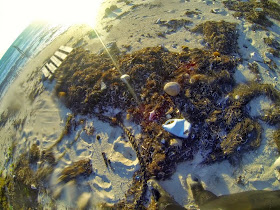This post about a invasive species and marine debris comes to us from Austin, who normally cares for the shorebirds on Central Wharf.
Although all of the sites we dove on the trip were beautiful and had a diversity of fish and invertebrate inhabitants, we were still reminded daily of the negative impacts that humans can have on the ocean ecosystem. On nearly every dive we saw several lionfish. Lionfish are native to the Indo Pacific but were introduced to the US Atlantic coast in the 1980s, when home aquarium owners released them into the ocean.
 |
| Lionfish lurking |
Now lionfish range from North Carolina to South America and have spread throughout the Caribbean in less than five years. Their venomous spines deter would-be predators and they have been documented to consume over 70 species of native fishes, threatening the population levels of these native fishes and the diversity of the reef. There are current efforts to research the spread of lionfish, and to encourage people to eat them in order to reduce their numbers. Lionfish is a delicacy (only the spines contain venom and these can be easily removed). We were lucky to try some lion fish ceviche on the trip! You can find out more about invasive lionfish here.
 |
| Lionfish ceviche |
We also observed a large amount of plastic pollution on the beaches where we went ashore, even on the uninhabited island of South Cat Key where we seined for needlefish.

Plastic debris in the ocean is a huge problem of which more and more people are becoming aware. Not only is it unsightly but it can be ingested by marine animals (this is a major threat to the health of some sea birds like albatross) or entangle them.
 |
| Plastic debris, even on uninhabited islands in the Caribbean |
Many plastics that end up in the ocean seem to disappear over time but in fact are still present as tiny particles. The effect of these particles on the food web after they are initially ingested by plankton remains unknown.
Learn about plastics in our oceans:
- Watch a recorded lecture about marine debris clean-up in Boston Harbor and the Gulf of Maine in this Aquarium Lecture Series talk by Rachel Miller.
- Follow an Aquarium educator on an expedition to the giant Pacific Garbage Patch.
- See what divers found on a pristine reef in Indonesia (you guessed it, plastics!)
And explore the issue of lionfish further:
- Read a guest blog about the invasion of the lionfish in the Caribbean
- Aquarium researchers in Belize have found lionfish as early as 2010
- And they continue to find them in Belize
- See lionfish in their native habitat off Fiji
No comments:
Post a Comment